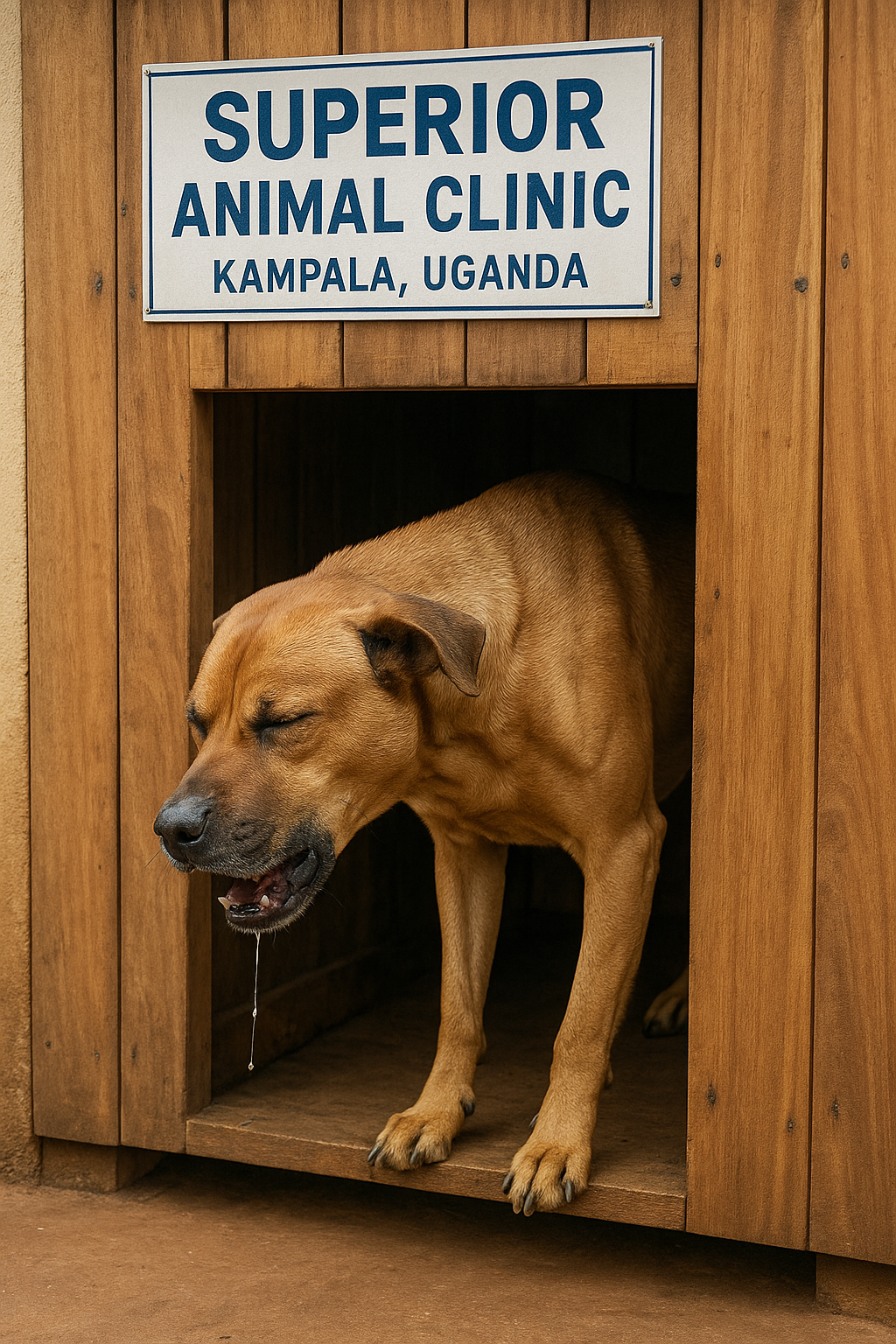
Has your dog suddenly started coughing like there’s something stuck in their throat? Or maybe you’ve noticed that funny “goose-honk” sound and now you’re worried it could be kennel cough? You’re not alone—many dog owners in Kampala search for things like “dog doctor near me for coughing dogs,” “kennel cough treatment in Kampala,” or “best vet for sick dogs in Uganda.”
At Superior Animal Clinic, located in Makindye along Salaama Road, we see this problem almost every week. Dog owners from Ntinda, Old Kampala, Kasubi, Nsambya, Katwe, Zana, Nakasero, Mityana, Buziga, Munyonyo, Nakawa, Rubaga, Muyenga, Naguru, Bugolobi, Kabowa, Kabojja, Lugogo, Lubowa, Seguku, Ndejje, Kololo, Mutundwe, Bukoto, Bulindo, and Kulambiro trust us as their go-to veterinary clinic for kennel cough treatment.
This article is your easy-to-follow guide to everything you need to know: what kennel cough is, the common causes in Uganda, which dogs are more prone, treatment options available at Superior Animal Clinic, how to care for your dog at home, and most importantly, how to prevent it from happening again.
What Is Kennel Cough in Dogs?
If you’re a dog owner in Kampala and your furry friend suddenly starts making a loud, dry, hacking cough — almost like a goose honk — you might immediately ask, “Is my dog choking, or is this something more serious?” Very often, the answer is kennel cough.
Kennel cough, medically called canine infectious tracheobronchitis, is a highly contagious respiratory infection that affects dogs of all breeds and ages in Uganda. It gets its name because it often spreads quickly in places where many dogs are kept together — such as boarding kennels, shelters, training centers, or even dog parks around Kampala.
The condition affects your dog’s trachea (windpipe) and bronchi (airways leading to the lungs), making the throat and respiratory passages irritated and inflamed. This irritation is what causes the harsh, persistent cough that worries most pet owners.
At Superior Animal Clinic in Makindye, we usually explain it to dog parents like this: kennel cough is similar to the flu or a chest cold in humans. It can be mild and self-limiting in some dogs, but in others — especially puppies, senior dogs, unvaccinated dogs, or those with weak immune systems — it can quickly turn into a serious infection, even pneumonia.
There are two main forms of kennel cough that we commonly treat in Kampala:
- Viral kennel cough – caused by viruses like canine parainfluenza virus or adenovirus.
- Bacterial kennel cough – most often from a bacteria called Bordetella bronchiseptica.
Many times, it’s a combination of both bacteria and viruses, which makes the infection spread easily from one dog to another — even through air droplets, shared bowls, or direct nose-to-nose contact.
👉 In simple terms: if your dog is coughing and you live in areas like Ntinda, Muyenga, Munyonyo, Old Kampala, Kasubi, or Lubowa, chances are they might have picked up kennel cough from another dog.
That’s why early diagnosis and treatment at Superior Animal Clinic is the safest way to protect your pet and prevent the infection from spreading to other dogs in your neighborhood.
Common Causes of Kennel Cough in Uganda
Many dog owners in Kampala first notice kennel cough when their pet suddenly develops a harsh, dry cough that won’t go away. But where does it come from? At Superior Animal Clinic in Makindye, we’ve treated hundreds of dogs from Ntinda, Old Kampala, Kasubi, Nsambya, Katwe, Zana, Buziga, Munyonyo, Nakawa, Muyenga, Lubowa, and beyond, and here are the most common causes we see:
1. Close Contact With Other Dogs
Kennel cough spreads just like the flu in humans. If your dog spends time in:
- Boarding facilities
- Dog training centers
- Markets or busy compounds in Old Kampala, Katwe, or Kasubi
they’re more likely to pick it up from another coughing dog.
2. Poorly Ventilated Spaces
In many neighborhoods across Kampala, dogs are kept in small kennels or cages with little airflow. Crowded, stuffy spaces (like in some shelters or poorly designed boarding kennels) create the perfect breeding ground for kennel cough bacteria and viruses.
3. Air Pollution and Dust
If you live in areas with heavy traffic, road construction, or dusty compounds (like parts of Zana, Ndejje, or Kisenyi), your dog’s airways may get irritated. This weakens their natural defenses, making it easier for kennel cough germs to take hold.
4. Weak Immune System
Dogs that are:
- Puppies or very old
- Unvaccinated
- Malnourished or recovering from another illness
are at higher risk because their immune systems can’t fight off infections as strongly.
5. Stress and Sudden Environmental Changes
Moving houses, staying at a new boarding kennel, or long transport (such as dogs traveling from Mityana to Kampala) can stress your dog. Stress reduces immunity and makes dogs more vulnerable to kennel cough.
6. Mixed Dog Populations
In busy areas of Kampala where many dogs roam freely (like Mutundwe, Katwe, or Kasubi), kennel cough spreads faster because there’s little control over sick or unvaccinated dogs.
7. Sudden Weather Changes
Kampala’s weather can shift quickly between hot afternoons and chilly evenings, especially in areas like Muyenga, Munyonyo, and Buziga near the lake. These fluctuations stress your dog’s respiratory system, making them more prone to infections like kennel cough.
8. Lack of Vaccination
Dogs that are not protected with the kennel cough vaccine (Bordetella, parainfluenza, adenovirus) are far more likely to catch the infection. In fact, many kennel cough cases we treat at Superior Animal Clinic come from unvaccinated dogs.
9. Shared Food and Water Bowls
In crowded compounds or community settings where multiple dogs drink from the same water bowls or eat from the same feeding pans, the germs that cause kennel cough spread quickly. This is common in densely populated areas like Katwe, Kasubi, and Old Kampala.
10. Exposure to Cold or Damp Environments
Dogs that sleep outside in cold or damp conditions (especially during rainy seasons in Kampala) are more vulnerable. Wet, chilly nights weaken their immune defenses and allow respiratory germs to thrive.
11. Previous Respiratory Illness
Dogs that have suffered from other respiratory infections, allergies, or even untreated flu-like symptoms are at higher risk. Their lungs and throat are already sensitive, so kennel cough germs easily cause complications.
12. Frequent Movement and Travel
Some dogs travel often with their owners—from Mityana to Kampala, or between neighborhoods like Ntinda, Lubowa, and Seguku. Every new environment exposes them to different dogs and germs, raising their risk of infection.
13. Inadequate Nutrition
A poorly fed dog has a weaker immune system. Low-quality diets lacking in protein, vitamins, and minerals leave the body defenseless against kennel cough. At Superior Animal Clinic, we see that dogs on balanced diets recover faster than malnourished ones.
14. Stress from Loud or Harsh Environments
Living in noisy or stressful environments—such as areas with heavy traffic, construction, or constant loud sounds—can stress your dog. Stress alone won’t cause kennel cough, but it lowers immunity, giving bacteria and viruses the upper hand.
👉 At Superior Animal Clinic, we don’t just treat kennel cough—we help you understand its causes so you can protect your dog in the future.
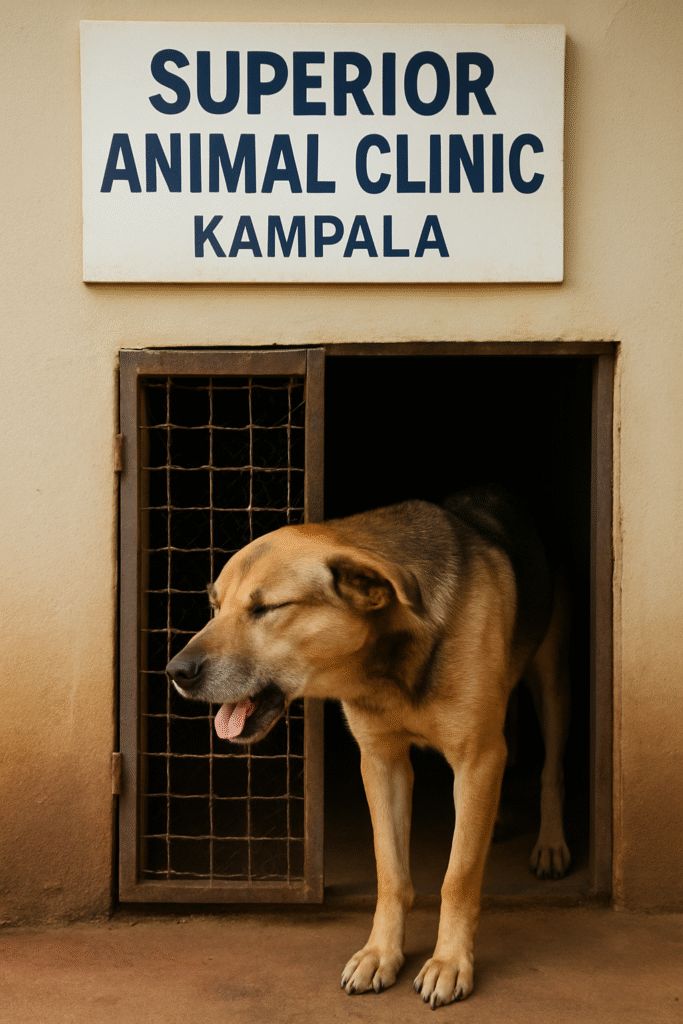
Predisposing Factors – Which Dogs Are More Prone?
- Puppies and senior dogs – weaker immune systems.
- Unvaccinated dogs – higher risk of infection.
- Dogs kept in crowded conditions – such as boarding houses or shelters.
- Breeds with short noses (like Pugs, Bulldogs, and Shih Tzus) – more likely to develop respiratory issues.
Symptoms of Kennel Cough in Dogs in Kampala, Uganda
When a dog develops kennel cough, the signs are usually hard to miss. At Superior Animal Clinic in Makindye, we often receive worried calls from dog owners in Ntinda, Muyenga, Munyonyo, Old Kampala, Katwe, Nakawa, and Buziga saying, “My dog is coughing nonstop” or “It sounds like something is stuck in my dog’s throat.”
Here are the most common symptoms of kennel cough that every dog owner in Kampala should watch out for:
1. Persistent, Harsh Cough
- The most telling symptom is a dry, hacking cough that can sound like a goose honk.
- It usually gets worse when your dog is excited, exercising, or pulled on a leash.
- Many owners mistake it for choking or something stuck in the throat.
2. Gagging or Retching
- Dogs often retch or gag after coughing fits.
- Some may bring up small amounts of white foamy saliva or mucus.
3. Nasal Discharge and Watery Eyes
- Mild runny nose and teary eyes are common, especially in dusty areas like Katwe or Old Kampala where pollution irritates the airways.
4. Sneezing and Throat Irritation
- Dogs with kennel cough may sneeze repeatedly or paw at their face because of throat discomfort.
5. Loss of Appetite and Lethargy
- In moderate to severe cases, your dog may become less interested in food.
- They may seem weak, tired, and less playful, especially in puppies or older dogs.
6. Fever (in Severe Cases)
- Most mild cases don’t cause fever, but when kennel cough progresses, some dogs may develop a low-grade fever.
⚠️ When to See a Vet Immediately
If you notice:
- Difficulty breathing
- Continuous coughing fits day and night
- Blood in mucus
- Complete loss of appetite or severe weakness
👉 Bring your dog straight to Superior Animal Clinic in Makindye, Kampala. These may be signs that kennel cough has developed into pneumonia, which is far more serious.
💡 Tip for Kampala Dog Owners:
If your dog has just started coughing but is still eating and active, call us at Superior Animal Clinic for advice. We’ll guide you on whether your dog needs immediate treatment or supportive care at home.
How We Treat Kennel Cough at Superior Animal Clinic
When you bring your dog to Superior Animal Clinic in Makindye, Kampala, our goal is not just to stop the cough but to restore your dog’s comfort, boost their immunity, and prevent future infections. Here’s exactly what we do:
🔍 1. Thorough Examination & Diagnosis
- We start by asking you questions about your dog’s history (how long they’ve been coughing, if they’ve been around other dogs, vaccination status, diet).
- A physical exam follows, where we check the chest, throat, temperature, and listen to the lungs.
- In severe or unclear cases, we may run blood tests or X-rays to rule out pneumonia or other conditions.
💊 2. Tailored Medication Plan
We do not use a “one-size-fits-all” approach. Treatment is based on your dog’s age, health, and severity of the infection:
- Antibiotics (such as doxycycline or amoxicillin-clavulanate) to fight bacterial infections.
- Cough suppressants to ease irritation and help your dog rest.
- Anti-inflammatory drugs to reduce swelling and pain in the throat and airways.
- Nebulization and steam therapy in-clinic to open airways and make breathing easier.
- Immune boosters and multivitamins to help recovery and prevent relapses.
💧 3. Supportive & Emergency Care
For very weak dogs, especially puppies or seniors, we provide:
- IV fluids to correct dehydration.
- Nutritional support with easily digestible, soothing foods.
🏡 4. Home Care Instructions
We guide you on how to care for your dog after treatment:
- Keeping your dog isolated to prevent spreading infection.
- Preparing soft, warm meals (like rice with chicken broth) that are easy on the throat.
- Using steam therapy at home (simple bathroom steam sessions).
- Monitoring progress and knowing when to return for review.
💉 5. Prevention for the Future
Once your dog recovers, we strongly recommend:
- Kennel cough vaccination (available at Superior Animal Clinic).
- Regular vet check-ups to keep your dog’s immunity strong.
- Advice on safe kennels and boarding facilities around Kampala.
👉 At Superior Animal Clinic, every dog is treated like family. Whether you’re in Ntinda, Muyenga, Nakawa, Lubowa, or Kololo, our clinic on Salaama Road is fully equipped to handle both mild and severe cases of kennel cough.
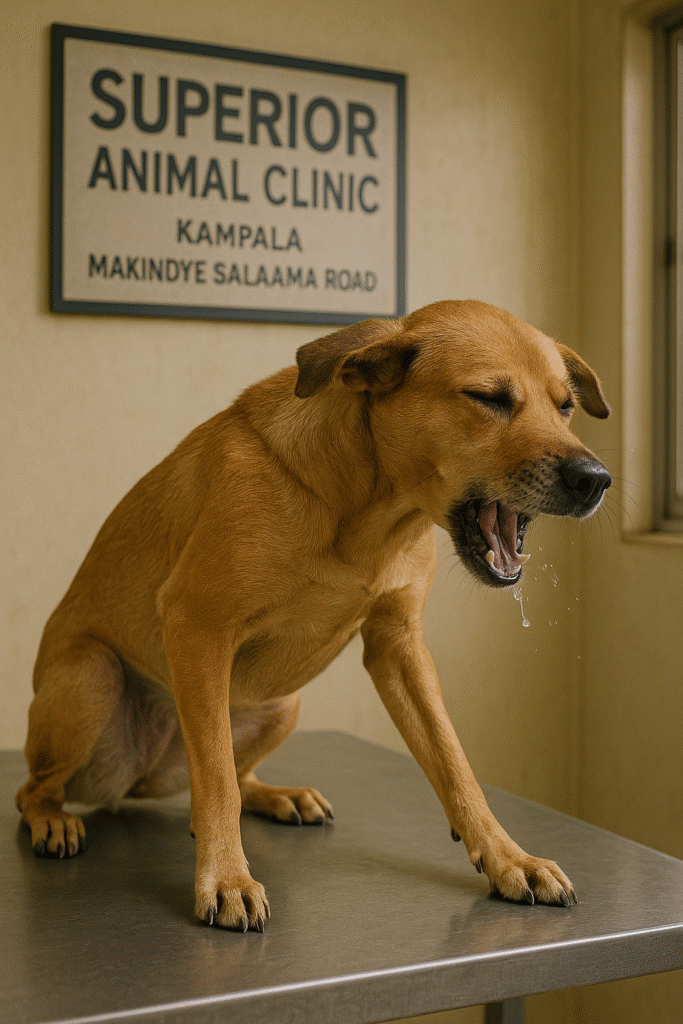
Best Foods for Dogs with Kennel Cough in Uganda
When your dog is battling kennel cough, the right food can make all the difference. Since coughing irritates the throat and sometimes lowers appetite, it’s best to focus on soft, soothing, and nutrient-rich meals that are easy to swallow and boost the immune system. At Superior Animal Clinic in Makindye, Kampala, we always advise dog owners to adjust their pet’s diet during recovery. Here’s what works best:
1. Warm Chicken Broth
- Why it helps: Warm broth soothes the throat, encourages hydration, and provides comfort.
- Tip: Use skinless chicken, avoid onions, garlic, or too much salt.
2. Boiled Chicken and White Rice
- Why it helps: A gentle, bland diet that’s easy on the stomach and throat.
- Tip: Shred the chicken into small pieces and mix with soft rice to make swallowing easier.
3. Pumpkin or Sweet Potatoes (Mashed)
- Why it helps: Rich in vitamins A and C which support the immune system.
- Tip: Steam or boil until very soft, then mash before serving.
4. Oatmeal Porridge
- Why it helps: Oats provide fiber and energy while being gentle on a sore throat.
- Tip: Cook plain oats with water or unsalted chicken broth—avoid sugar or milk.
5. Eggs (Scrambled or Boiled)
- Why it helps: High in protein and easy to digest.
- Tip: Keep it plain—no oil, spices, or onions.
6. Soft Canned Dog Food or Rehydrated Kibble
- Why it helps: Soft food is less irritating to the throat compared to dry kibble.
- Tip: If you only have dry kibble, soak it in warm water or broth until it softens.
7. Carrots and Green Beans (Well-Cooked)
- Why it helps: Packed with vitamins and antioxidants for faster recovery.
- Tip: Steam until soft and mash or finely chop to avoid choking.
8. Fresh Water and Electrolytes
- Why it helps: Hydration is critical to recovery. Dogs coughing often lose fluids.
- Tip: You can add a small amount of electrolyte solution (like ORS) recommended by our vets for weak dogs.
Foods to Avoid for Dogs with Kennel Cough
- Dry crunchy treats or bones – they irritate the throat.
- Spicy, oily, or seasoned human food – can worsen coughing.
- Cold foods straight from the fridge – may irritate the airways further.
👉 At Superior Animal Clinic, we guide dog owners on meal plans tailored to each dog’s needs. For severe cases, we may also recommend nutritional supplements and immune boosters alongside medication to speed up recovery.
Home Remedies for Kennel Cough (Supportive Care)
While veterinary care is always best, some home remedies may help mild cases:
- Humidifier or steam therapy – keeps airways moist.
- Honey in warm water – natural throat soother (only for adult dogs, not puppies).
- Keeping your dog warm and hydrated.
⚠️ Important: Never rely on home remedies alone if your dog’s cough is persistent—kennel cough can worsen into pneumonia.
Prognosis – What Happens If Kennel Cough Is Untreated?
If left untreated, kennel cough can:
- Lead to pneumonia (life-threatening in puppies and older dogs).
- Cause chronic cough and long-term respiratory damage.
- Spread to other dogs at home or in the neighborhood.
That’s why early treatment at Superior Animal Clinic is the safest choice.
How to Prevent Kennel Cough in Kampala
Preventing kennel cough is always better (and cheaper) than treating it. At Superior Animal Clinic in Makindye, we emphasize prevention strategies tailored to dog owners across Kampala and surrounding areas. Here’s what you can do to keep your dog safe:
1. Vaccinate Your Dog Regularly
- The kennel cough vaccine (Bordetella vaccine) is the most effective protection.
- At Superior Animal Clinic, we recommend:
- Puppies: vaccination from 6–8 weeks of age.
- Adult dogs: annual boosters, especially for social or outdoor dogs.
- Puppies: vaccination from 6–8 weeks of age.
- If you live in Ntinda, Muyenga, Munyonyo, Makindye, or Bugolobi, where dogs frequently meet at training centers, grooming shops, or boarding facilities, vaccination is especially important.
2. Avoid Overcrowded or Poorly Ventilated Kennels
- Kennel cough thrives in places where many dogs are kept together, such as boarding houses in Old Kampala, Katwe, and Nakawa.
- Before boarding your dog, ensure the kennel has good ventilation, hygiene, and vaccination requirements.
3. Maintain Good Nutrition and Strong Immunity
- A strong immune system helps your dog resist infections.
- Feed your dog a balanced diet rich in protein, vitamins, and minerals.
- At Superior Animal Clinic, we can recommend the best dog foods available in Kampala to boost immunity.
4. Reduce Exposure to Irritants
- Smoke, dust, and pollution (common in busy areas like Katwe, Old Kampala, and Kisenyi) irritate the respiratory tract and make dogs more vulnerable.
- Keep your dog away from heavy traffic areas and avoid exposing them to charcoal smoke or household sprays.
5. Practice Good Hygiene at Home
- Regularly clean your dog’s bedding, bowls, and living spaces.
- Disinfect shared items if you have multiple dogs.
- Avoid sharing leashes, collars, or toys with other dogs in public areas like Muyenga, Kololo, or Ntinda.
6. Regular Vet Check-Ups at Superior Animal Clinic
- Routine check-ups allow us to detect early signs of kennel cough and other respiratory problems.
- Dog owners from Lubowa, Seguku, Ndejje, Bulindo, and Kulambiro often bring their pets for regular preventive care, which greatly reduces kennel cough risks.
✅ Takeaway for Dog Owners:
Kennel cough is preventable if you stay proactive. The combination of vaccination, good hygiene, strong nutrition, and regular vet visits at Superior Animal Clinic ensures your dog stays happy, healthy, and free from this contagious disease.
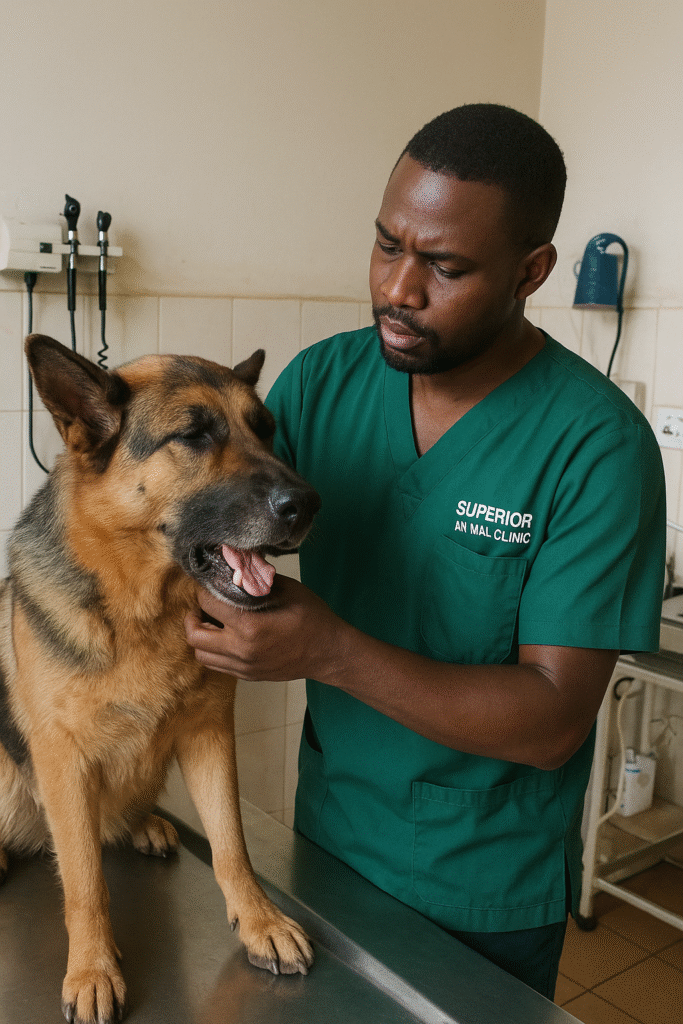
FAQs – Kennel Cough in Dogs in Kampala
Q1: What is kennel cough in dogs and how can I tell if my dog has it in Kampala?
Kennel cough, or canine infectious tracheobronchitis, is a contagious respiratory infection causing a dry, harsh cough, gagging, and nasal discharge. Dog owners in neighborhoods like Ntinda, Old Kampala, Katwe, Makindye, and Bugolobi often notice a “goose-honk” sound in affected dogs.
Q2: How does my dog get kennel cough in Kampala?
Dogs commonly contract kennel cough through direct contact with infected dogs, shared toys, grooming equipment, or boarding facilities. Busy areas like Muyenga, Munyonyo, Kololo, and Nakasero with many dog social interactions see more cases. Environmental factors such as dust and pollution in Old Kampala and Katwe also increase risk.
Q3: Which dogs are most at risk of getting kennel cough in Uganda?
- Puppies and older dogs with weaker immune systems.
- Unvaccinated dogs in all Kampala neighborhoods.
- Dogs living in boarding kennels or crowded homes, such as in Makindye, Bugolobi, Lubowa, or Seguku.
- Short-nosed breeds (Pugs, Bulldogs) are more prone due to airway anatomy.
Q4: Can kennel cough be treated at home in Kampala?
Mild cases may improve with rest, humidity, and supportive care, but veterinary treatment is essential. At Superior Animal Clinic in Makindye, we provide antibiotics, cough suppressants, anti-inflammatories, and nebulization therapy to ensure fast recovery and prevent complications like pneumonia.
Q5: What medications are used to treat kennel cough in dogs in Kampala?
- Antibiotics (e.g., doxycycline, amoxicillin) for bacterial infections.
- Cough suppressants to relieve harsh coughing.
- Anti-inflammatory drugs to reduce airway irritation.
- Supportive fluids for weak or dehydrated dogs.
Q6: How long does it take for a dog to recover from kennel cough in Kampala?
With proper veterinary care at Superior Animal Clinic, most dogs recover within 1–3 weeks, depending on the dog’s age, breed, and overall health. Untreated dogs may develop pneumonia, prolonged coughing, or chronic respiratory issues.
Q7: Can my dog catch kennel cough again in Kampala?
Yes, reinfection is possible, especially if your dog is unvaccinated or exposed to infected dogs in high-risk neighborhoods like Ntinda, Makindye, Old Kampala, and Katwe. Annual vaccination boosters at Superior Animal Clinic help prevent recurrence.
Q8: Are there home remedies for kennel cough for dogs in Kampala?
Supportive home care can help:
- Humidifiers or steam therapy to soothe airways.
- Warm chicken broth or soft food to keep your dog nourished.
- Plenty of rest and isolation from other dogs.
⚠️ Always consult a vet—home remedies alone cannot treat serious infections.
Q9: How can I prevent kennel cough in my dog in Kampala?
- Vaccinate your dog at Superior Animal Clinic in Makindye.
- Avoid overcrowded or poorly ventilated boarding facilities in Muyenga, Bugolobi, or Kololo.
- Practice good hygiene: clean bedding, toys, and bowls regularly.
- Keep your dog away from areas with many social or free-roaming dogs.
Q10: Where can I find the best kennel cough treatment for dogs in Kampala?
Superior Animal Clinic, Makindye, Kampala is the trusted choice for dog owners across Ntinda, Old Kampala, Kasubi, Nsambya, Katwe, Zana, Nakasero, Mityana, Buziga, Munyonyo, Nakawa, Rubaga, Muyenga, Naguru, Bugolobi, Kabowa, Kabojja, Lugogo, Lubowa, Seguku, Ndejje, Kololo, Mutundwe, Bukoto, Bulindo, and Kulambiro. We provide vaccinations, medications, home care advice, and follow-up care to ensure your dog fully recovers.
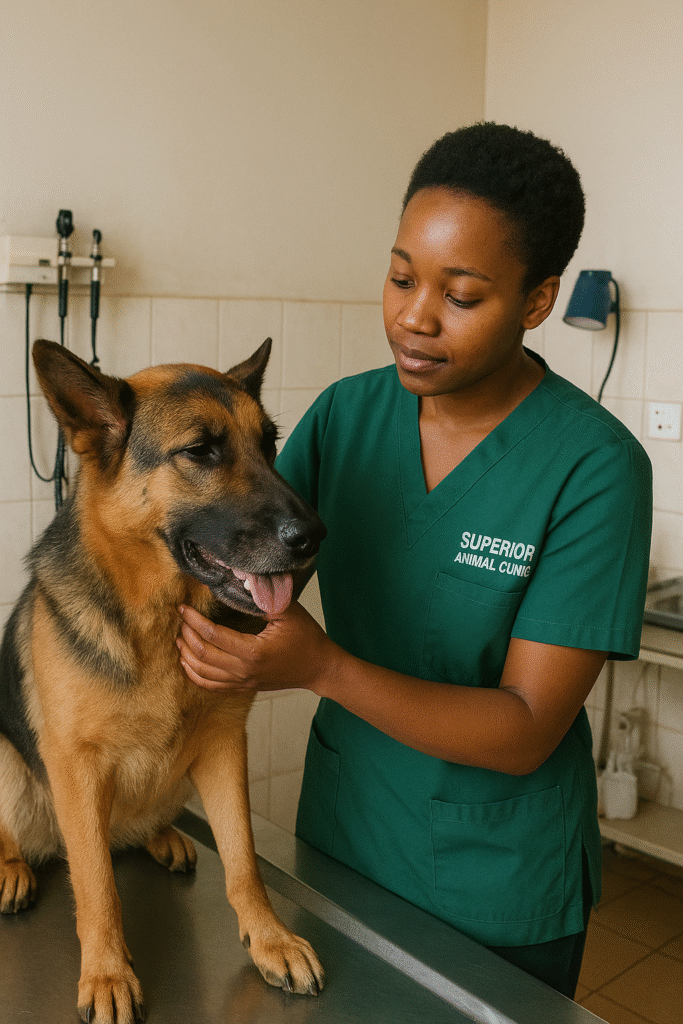
Q11: How much does it cost to treat kennel cough in Kampala?
Treatment costs vary depending on your dog’s condition and severity. At Superior Animal Clinic, prices are affordable and transparent, including consultation, medications, and supportive care. Most mild cases start around UGX 100,000–200,000, while severe cases requiring hospitalization may cost more.
Q12: Who is the best doctor for kennel cough in Kampala?
At Superior Animal Clinic in Makindye, our experienced veterinarians specialize in respiratory diseases in dogs. Dog owners from all neighborhoods—including Kololo, Ntinda, Old Kampala, and Makindye—trust us for safe, effective, and fast kennel cough treatment.
Q13: Is there a vaccination for kennel cough in Uganda?
Yes, the Bordetella vaccine protects against kennel cough. We also combine it with other routine vaccines for complete protection. Dogs in high-risk areas like Makindye, Bugolobi, Muyenga, and Ntinda are strongly advised to vaccinate.
Q14: How much does it cost to vaccinate my dog against kennel cough in Kampala?
At Superior Animal Clinic, the kennel cough vaccine costs between UGX 60,000 per dose, depending on your dog’s size and age. Annual boosters are recommended for continuous protection.
Q15: Can vaccinated dogs still get kennel cough?
Yes, vaccines reduce severity and risk but do not always provide 100% immunity. Vaccinated dogs often have milder symptoms and faster recovery compared to unvaccinated dogs.
Areas in Kampala Where Kennel Cough Is Common
Kennel cough can happen anywhere, but certain neighborhoods in Kampala have higher risks due to dog population, boarding facilities, and social interaction. At Superior Animal Clinic in Makindye, we often see cases from the following areas:
- Ntinda, Old Kampala, Katwe, and Kisenyi – busy urban neighborhoods where dogs frequently interact at parks, streets, and boarding centers.
- Makindye, Bugolobi, Muyenga, and Munyonyo – areas with many dog boarding kennels and social dogs.
- Kololo, Nakasero, and Naguru – dogs here mingle in parks, dog training classes, and pet-friendly spaces, increasing exposure.
- Lubowa, Seguku, Ndejje, Bulindo, and Kulambiro – fast-growing residential neighborhoods where many families own multiple dogs.
- Mityana and surrounding outskirts – dogs roam freely and mix with others from Kampala, raising the chance of infection.
✅ Tip for Dog Owners: No matter where you live, vaccination, good hygiene, and regular vet check-ups at Superior Animal Clinic are the best ways to protect your dog from kennel cough.
Why Choose Superior Animal Clinic for Kennel Cough Treatment in Kampala?
- Experienced veterinarians in dog respiratory diseases.
- Affordable and transparent pricing.
- Convenient location along Salaama Road, Makindye.
- Trusted by dog owners across Kampala – from Ntinda to Lubowa.
- Comprehensive care – from diagnosis, treatment, vaccination, to follow-up.
When you search for “best vet for kennel cough near me” or “dog doctor in Kampala for cough,” you’ll find Superior Animal Clinic as your number one choice.
✅ Final Takeaway:
If your dog is coughing, don’t ignore it. Visit Superior Animal Clinic in Makindye, Kampala today for safe, effective, and affordable kennel cough treatment. We proudly serve dog owners in Ntinda, Old Kampala, Kasubi, Nsambya, Katwe, Zana, Nakasero, Mityana, Buziga, Munyonyo, Nakawa, Rubaga, Muyenga, Naguru, Bugolobi, Kabowa, Kabojja, Lugogo, Lubowa, Seguku, Ndejje, Kololo, Mutundwe, Bukoto, Bulindo, and Kulambiro.
👉 Call us now or visit our clinic to keep your dog healthy, happy, and cough-free.
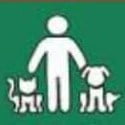
Trying out ku66.info for the first time. Seems like a lot of slots. No problem to navigate the site. Hoping for some good luck, fingers crossed! Go see a look: ku66